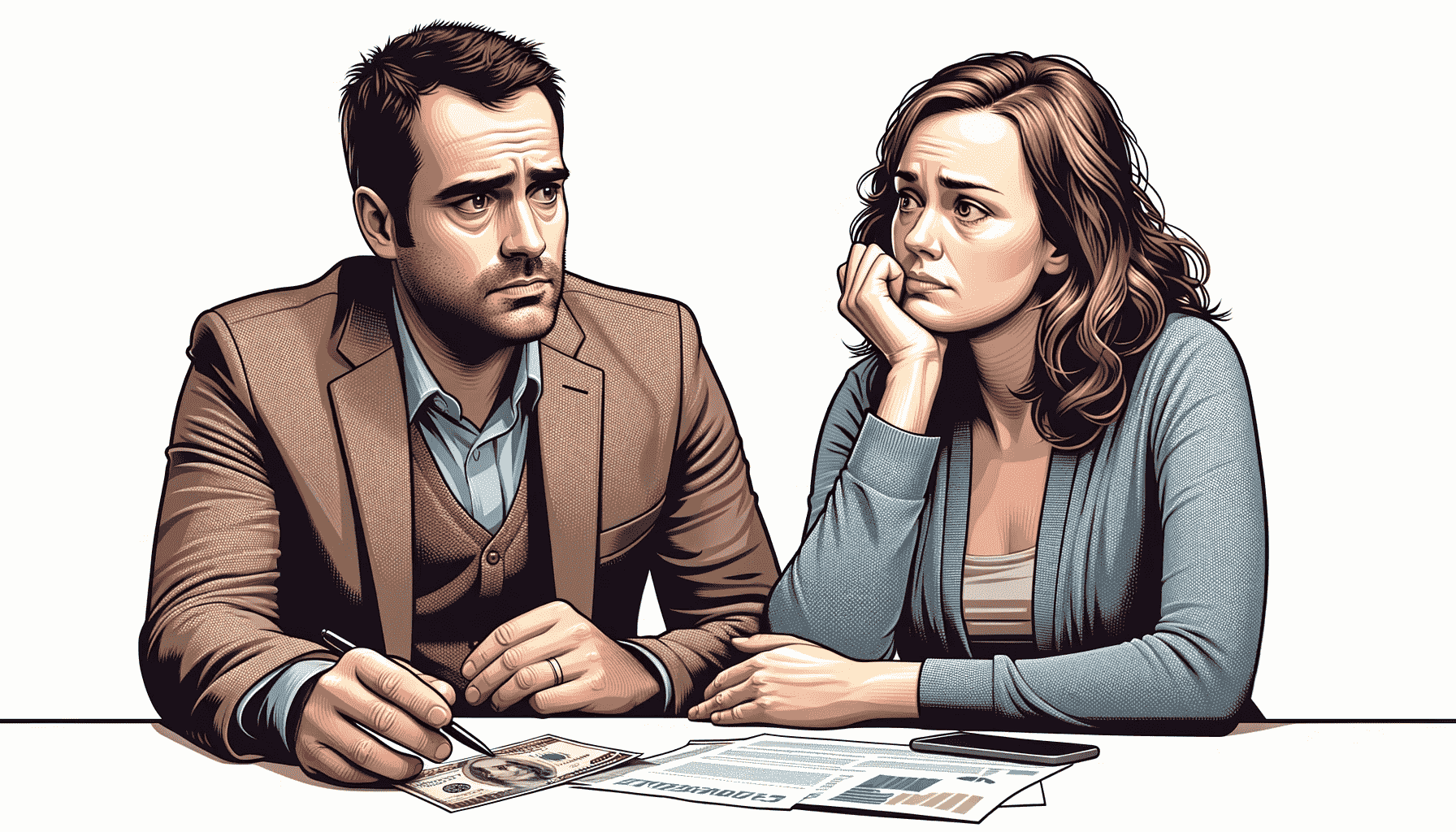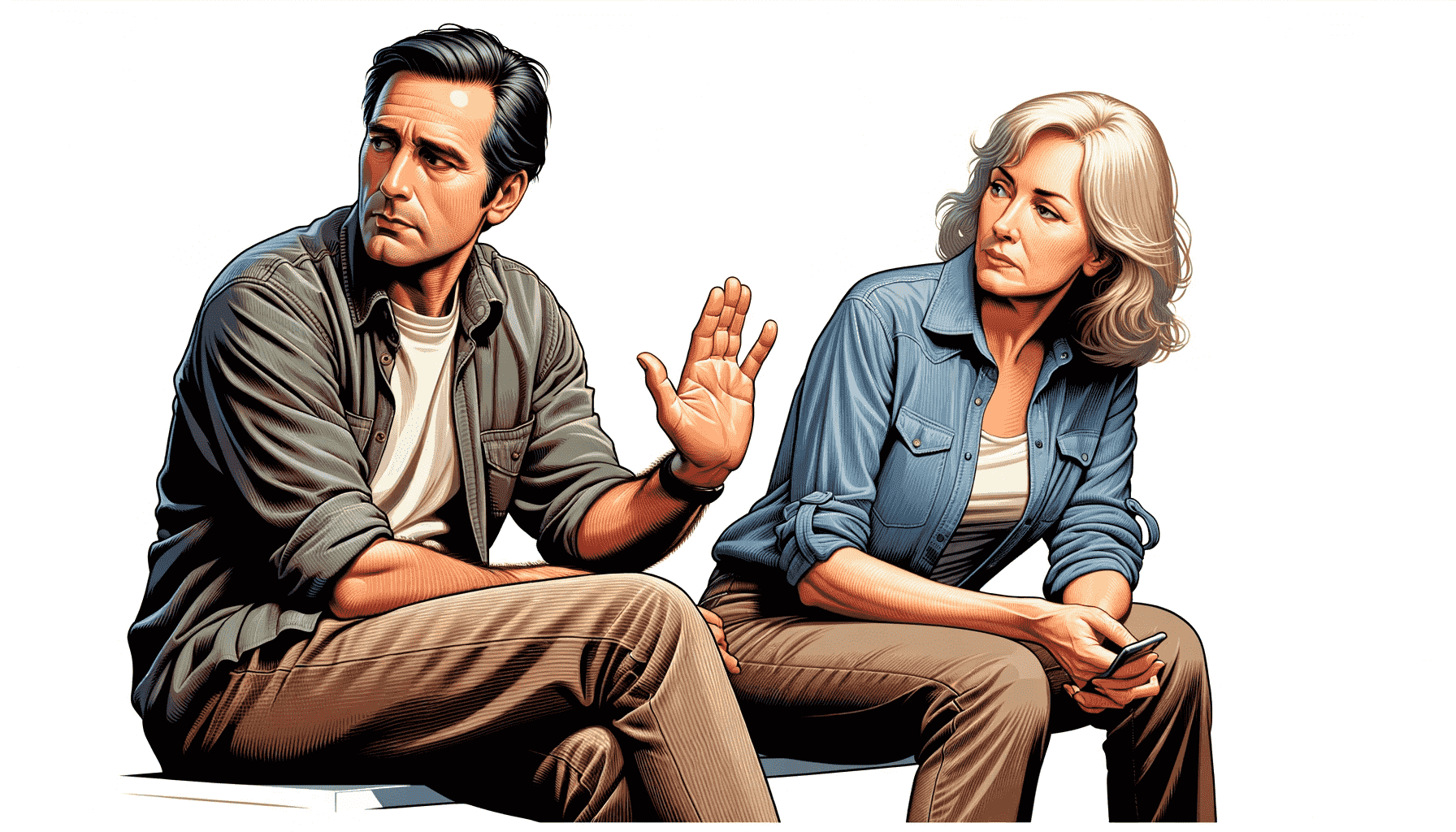Sharing is caring!
Dating can be a wonderful journey, no matter your age. But when you’re in your 50s, it’s a bit different than when you were younger.
You’ve lived more, know yourself better, and probably have a clearer picture of what you want in a partner.
It’s an exciting time to find love, but it’s also important to be cautious.
When you’re dating in your 50s, there are certain warning signs, or “red flags”, to look out for in the people you meet. These signs can help you understand if someone might not be the right match for you.
In this article, we’re going to talk about some of these red flags. Knowing them can help you make better choices and find someone who’s a good fit for your life.
It’s not just about avoiding the wrong people, but also about understanding what makes a healthy and happy relationship.
Whether you’re new to dating at this age or have been trying it for a while, these tips can be really helpful.
1. Lack of Communication
When you’re dating in your 50s, clear and open communication is vital.
It’s a red flag if your partner consistently avoids discussing important topics or expressing their feelings. This can lead to misunderstandings and frustration.
Remember, at this stage in life, you’re looking for a partner who can engage in honest and straightforward conversations, not someone who keeps you guessing about their thoughts and feelings.
In a healthy relationship, both parties feel comfortable sharing their opinions and concerns.
If you notice that your partner frequently changes the subject when things get serious or shows reluctance in sharing personal details, it’s a cause for concern.
Effective communication is the bedrock of any strong relationship, and without it, you’re likely to encounter problems down the road.
Look at how your partner communicates in different situations. Do they listen attentively and respond thoughtfully, or do they dominate conversations and ignore your input?
Paying attention to these patterns can reveal a lot about their communication style and whether it’s compatible with yours. After all, you deserve a partner who values your voice as much as their own.
2. Inflexibility or Unwillingness to Compromise

Be cautious of someone who is inflexible and set in their ways. By the time you reach your 50s, it’s common to have established routines and preferences.
However, a partner who is unwilling to adapt or compromise can be challenging in a relationship.
A relationship involves two people, and both must be willing to make adjustments.
If your date is rigid about their routines, unwilling to try new things, or not considerate of your preferences, it could lead to frustration and conflict.
Compromise and flexibility are signs of a healthy relationship. Look for someone open to your ideas, willing to make changes, and who considers your needs as well as their own.
A relationship should be about growing together, not just sticking to what’s familiar and comfortable.
3. Self-Centered Behavior
Self-centered behavior is a major red flag in any relationship, especially in your 50s.
At this stage, you’re looking for a partner who values mutual respect and understanding.
Hence, if you notice that your date often puts their needs and desires above yours, without considering your feelings, it’s a sign of selfish behavior.
This can manifest in many ways, such as constantly talking about themselves without showing interest in your life or making decisions that affect both of you without your input.
Furthermore, observe how they interact with others, such as waitstaff or friends. Do they show kindness and empathy, or are they dismissive and self-absorbed? The way they treat people around them can be a reflection of their true character.
You deserve someone who not only cares for you but also extends their compassion and respect to others.
Importantly, consider how they react when you achieve something significant or face challenges.
A self-centered person may downplay your successes or be indifferent to your struggles. A caring and supportive partner, on the other hand, will celebrate your achievements and be there for you during tough times.
Look for someone genuinely interested in your well-being and happiness.
[Interesting: 7 Disadvantages Of Dating A Younger Man]
4. Pessimistic or Negative Outlook on Life
You’re at a point in life where you want someone who can laugh, enjoy the good times, and handle the bad with a bit of optimism.
So if every conversation turns into a list of complaints, it’s not just a downer – it could be a sign that they’re not the right fit for a positive future together.
Pay attention to how they talk about stuff – their job, their friends, their past. Are they always finding the fault in things, or can they see the bright side too?
And when you share your good news, are they genuinely happy for you, or do they somehow make it about the negatives?
It’s not just about being with someone positive – it’s about finding someone who can celebrate life’s ups and stay hopeful through its downs.
You want a partner who can ride the rollercoaster of life with a smile, not someone who makes every dip feel like a disaster.
5. Past Relationship Baggage
Entering the dating scene in your 50s, it’s natural for both you and your potential partners to have past relationship experiences.
However, excessive baggage from previous relationships can be a red flag.
For instance, when your date frequently talks about their exes or past grievances in a negative light, it may indicate that they haven’t fully moved on or processed their past.
It’s also worth paying attention to how they describe their past relationships. Do they take any responsibility for the failures, or do they always blame their ex-partners?
A person who cannot acknowledge their role in past relationship issues might struggle to contribute positively to a new relationship. You’re looking for a partner who has learned from their past, not someone who is stuck in it.
Furthermore, consider how their past experiences influence their behavior and expectations in the present.
If they are overly cautious or skeptical about love and relationships due to past hurts, it might prevent them from fully committing to a new relationship.
While it’s important to be understanding and patient, you also need a partner who is ready to embrace a new chapter with you, free from the shadows of their past.
6. Financial Irresponsibility

Financial habits can be a telling indicator in a relationship, especially in your 50s when financial stability is often a priority.
Hence, when your partner demonstrates a lack of financial responsibility, such as overspending or having significant debt without a clear plan to manage it, this could be a cause for concern.
It’s not just about how much they earn, but more importantly, how they manage their finances.
Observe their attitude towards money. Are they transparent about their financial situation, or do they avoid the topic altogether?
A partner who is secretive about their finances or seems to be living beyond their means might not be the best choice for a stable future together.
Financial honesty and prudence are key qualities to look for in a long-term partner.
Also, consider how they approach shared expenses. Do they insist on paying for everything, refuse to contribute, or expect you to cover most costs?
The way they handle money in the context of your relationship can offer insights into their financial values and compatibility with yours.
7. Inconsistent or Unreliable Behavior
You know how frustrating it can be when someone says they’ll do something and then… they don’t? That’s a big deal when you’re dating in your 50s.
Consistency is so important.
If your partner is all over the place, canceling dates last minute, or not keeping promises, it’s not just annoying – it’s a sign they might not be reliable long-term.
It’s about more than just being punctual; it’s about knowing you can count on them, whether it’s for a dinner date or something bigger down the line.
Think about how often they let you down. Is it just a rare thing, or does it happen all the time? We’re all human and make mistakes, but if it’s a pattern, it’s a problem. And how does this make you feel?
If you’re always wondering whether they’ll follow through on plans, that’s a lot of unnecessary stress.
8. Disrespectful or Controlling Behavior
Disrespect can manifest in many ways, from belittling comments to disregarding your opinions and boundaries.
Also, pay attention to how they react to differing opinions. Do they listen and engage respectfully, or do they become dismissive or aggressive?
When your partner is unable to handle disagreements constructively, they may resort to controlling behavior to assert their dominance.
Additionally, notice how they treat your personal space and decisions. A controlling partner may try to dictate your choices, from what you wear to who you spend time with.
It’s crucial to have a partner who supports your independence and respects your autonomy.
9. Unwillingness to Commit
At this stage in life, if you’re looking for a serious relationship, someone’s unwillingness to commit can be a significant red flag.
You might encounter people who are only interested in casual dating or aren’t looking to settle down. It’s important to recognize and respect these differences in intentions.
It’s all about alignment in relationship goals. If you’re seeking a committed partnership and they’re avoiding any talk of the future, it’s a sign that your expectations might not match. It’s crucial to be on the same page to avoid heartache down the line.
Communication is key here. Have an open and honest discussion about what you both want from the relationship.
If they shy away from these conversations or their answers are vague, it could be a sign that they’re not looking for the same level of commitment as you are.
10. Lack of Interest in Your Life and Passions

Think about a time when you were talking about something you love, only to realize the other person wasn’t listening.
It doesn’t feel great, does it?
When you’re dating, especially later in life, it’s so important to find someone who genuinely cares about what makes you tick – your hobbies, your career, your dreams.
If they seem uninterested or barely engage when you talk about these things, it’s a pretty clear sign they might not be as invested in the relationship as you are.
A good partner is your cheerleader, someone curious about your world and proud of your accomplishments.
They don’t just care about you; they care about what brings joy and meaning to your life. When both of you share and value each other’s interests, it creates a deeper and more.
11. Disregard for Boundaries
This could be as simple as not respecting your time, ignoring your requests for space, or pushing you into conversations or activities you’re not comfortable with.
Healthy relationships require mutual respect. If your date is not taking your boundaries seriously, they’re showing a lack of respect for your feelings and needs.
It’s important to feel safe and valued in a relationship, and that starts with respecting each other’s boundaries.
Notice how they react when you set a boundary. Do they apologize and respect your wishes, or do they become defensive and dismissive?
How they respond can tell you a lot about their attitude towards the relationship and you as a person.
12. Negative Influence on Your Self-Esteem
Pay attention to the things they say and how they make you feel. Are they supportive and uplifting, or do they often criticize you and your choices?
A partner who frequently makes negative comments about your appearance, decisions, or abilities can gradually undermine your self-confidence.
Remember, a good partner should be your cheerleader, not your critic. They should celebrate your strengths and be compassionate about your weaknesses.
If you feel worse about yourself when you’re with them, it might be a sign that this relationship isn’t healthy.
[Also Read: 5 Months Dating: What It Means And What To Expect]
FAQs

What are the major red flags to avoid when dating in your 50s?
When dating in your 50s, watch out for people who don’t communicate well, are not flexible, talk too much about themselves, hang onto past relationships, or show signs of financial problems.
These behaviors can create issues in a relationship. It’s also important to avoid people who don’t respect your boundaries, make you feel bad about yourself, or don’t show interest in your life and what you love doing.
These are signs that they might not be a good partner for you.
Are there some red flags we can talk about?
Yes, absolutely! Some red flags include when someone is not reliable, has a negative view of life, or doesn’t care about your interests and goals.
If a person often cancels plans, doesn’t keep promises, or makes you feel unsure, that’s a red flag. If they always see the bad side of things or bring you down, that’s another warning sign.
Also, if they don’t seem interested in your hobbies or what’s important to you, it might mean they’re not the right match.
Should I leave when I see these red flags?
Seeing a red flag doesn’t always mean you should leave right away, but it’s a sign to be careful. It’s a good idea to talk about your concerns with the person.
Sometimes, they might not realize their behavior is a problem.
However, if the red flags are serious like they don’t respect you or make you feel unsafe, it’s important to think about leaving for your well-being.
Trust your feelings and don’t ignore signs that something isn’t right.
How do I talk to my date about these red flags?
Talking about red flags can be tricky, but it’s important for a healthy relationship.
Try to choose a good time to talk when you’re both calm. Be honest and kind about what’s bothering you.
For example, if they’re always late, you could say, “I feel upset when you don’t arrive on time.
Can we work on this together?” Remember, it’s about working on issues as a team, not blaming each other.
Can these red flags change over time?
Yes, people can change, and red flags might not always be permanent. Sometimes, a person might not be aware of their behavior until it’s pointed out.
With communication and effort, some issues can be solved. But remember, not all red flags will go away, and you can’t force someone to change. It’s important to decide what you’re okay with and what’s a deal-breaker for you.
Always prioritize your happiness and safety in any relationship.
Sharing is caring!
